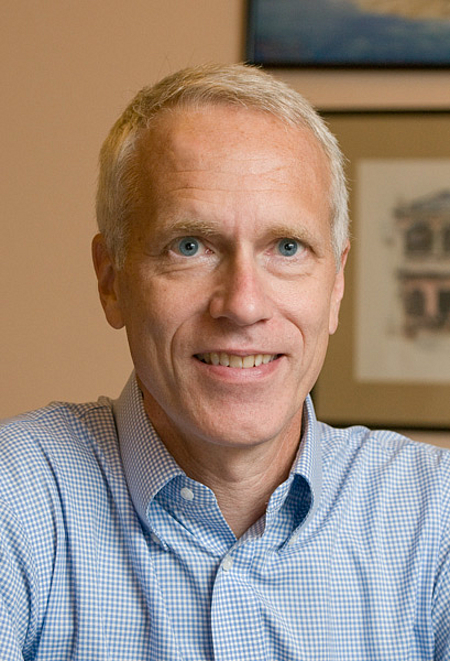Of molecular dances, G proteins and friendship
Keynote and round table with Nobel Laureate and Einstein BIH Visiting Fellow Brian Kobilka
All 200 seats were taken when Brian Kobilka (Nobel Prize in Chemistry 2012) started his lecture about G protein-coupled receptors (GPCRs) in the historical atmosphere of the Leibniz-Saal at the Berlin-Brandenburg Academy of Sciences and Humanities on 11th of July. The conference was opened by Prof. Peter Hildebrand, Prof. Ursula-Friederike Habenicht from the Einstein Foundation’s Executive Board spoke words of welcome and introduced the Einstein Foundation and its programs. The event served as the kick-off meeting of the “Early Career Scientist Forum on GPCR signal Transduction”, organised by Charité – Universitätsmedizin Berlin. Therefore, many young scientists, but also members of the Berlin public, took the opportunity to listen to Kobilka’s newest insights into GPCR signaling and potential medical applications.
So, what is GPCR signaling all about? G protein-coupled receptors conduct the majority of transmembrane responses to hormones and neurotransmitters, and mediate the senses of sight, smell and taste. Approximately half of all medications used today make use of this kind of receptors. Kobilka, who holds a professorship for Medicine and Molecular and Cellular Physiology at Stanford University, California, has been awarded an Einstein BIH Visiting Fellowship funded by Stiftung Charité in 2017. His research group at the Berlin Institute of Health (BIH) collaborates with the laboratory of Peter Hildebrand from the Charité – Universitätsmedizin at the Einstein Center Digital Future.
Jointly with his research colleague Roger Sunahara, Professor of Pharmacology at the University of California San Diego, Kobilka emphasised the fact that collaborations are a key factor for scientific progress. Sunahara, who has been working together with Kobilka over years and is an expert on GPCR structures and functions himself, said he considers himself very fortunate to conduct research with Kobilka of whom he not only thinks as an outstanding researcher, but also a very good friend.
The keynote of the “Meeting Einstein” event was followed by a round table, hosted by early career scientists Johanna Tiemann (University of Leipzig) and Alexander Hauser (University of Copenhagen). Aside from Kobilka and Sunahara, also Klaus Peter Hofmann (Charité – Universitätsmedizin Berlin) and Maria Waldhoer (InterAx Biotech AG) joined the panel discussion. Brian Kobilka is convinced that G protein-coupled receptors will continue to keep scientists busy in the future: “I’m fascinated by the fact that the more we know it seems like we still have a long way to go until we really understand it. It’ll be a field where people can find questions to address for many many years to come, I think.”
The Einstein Foundation is very grateful for this exceedingly successful and interesting lecture and the inspiring discussions and looks forward to new insight in the field of G protein-coupled receptors.
The Einstein BIH Visiting Fellowship aims to enhance the international profile of the Berlin Institute of Health by involving leading scientists from abroad in long-term academic research collaborations. Stiftung Charité generously funds the program.
Credits: Einstein Foundation / Sebastian Gabsch
Photo: L.A. Cicero

Funding program
Einstein BIH Visiting Fellows
Funding period
2017 – 2023
Project title
In silico GPCR: 'A computational microscope to determine receptor – G protein coupling specificity and functional selectivity'
Research area
Bioinformatics, Biophysics
Institution
Charité – Universitätsmedizin Berlin and Stanford University
2012
Nobel Prize in Chemistry
Since 2000
Professor of Medicine and Molecular and Cellular Physiology at Stanford University of Medicine, Stanford, USA
1988 – 1989
Assistant Professor at the Duke University Medical Center, North Carolina, USA